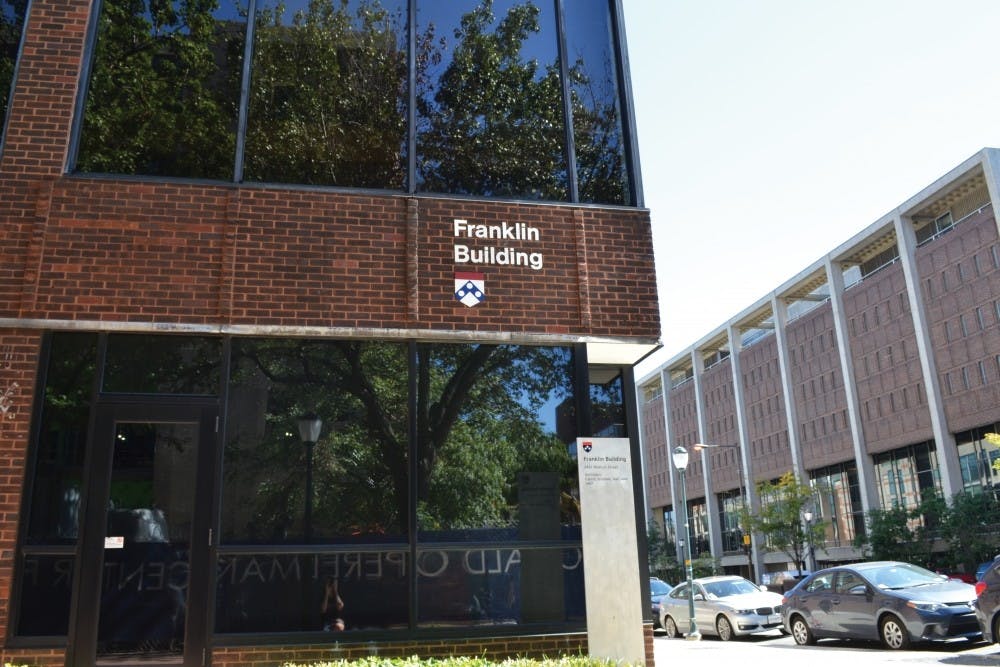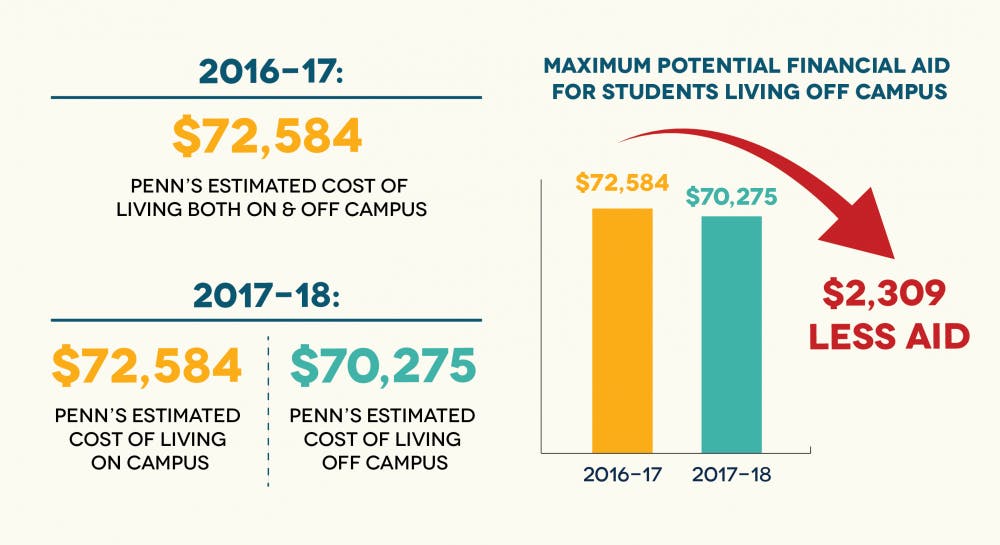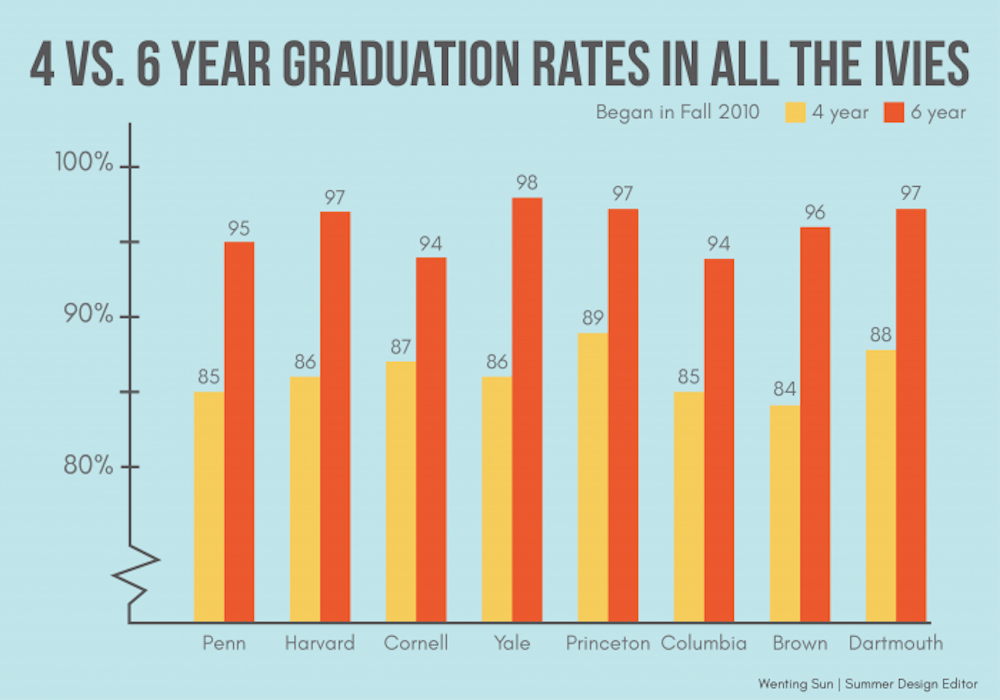
At Penn, the decision to move off campus already comes with strenuous cost calculations and complicated logistics for many students. Now, however, the University's changing financial aid policies for off-campus living are making these calculations even more complicated.
This past spring, Student Registration and Financial Services changed its policy for the distribution of aid to students living off campus. Before, students could receive up to $72,584 in financial aid, whether they lived off campus or on campus. Now, those who live off campus can only receive up to $70,275 in financial aid — almost $2,500 less.
The maximum amount of financial aid that can be given to students is based on the estimated cost of attendance for one year at Penn. This calculation includes tuition, fees, and approximated housing, dining, supplies, and transportation costs.
Many students say the University failed to communicate this reduction in financial aid for off-campus residents clearly to them, which has made it difficult for some to pay costs for housing for which they had signed months earlier.
The SRFS website still listed both on-campus and off-campus costs of attendance as $72,584 as recent as July 12. But on a Sept. 28 version of the archived website, the on-campus assumed cost was listed as $72,584, while the off-campus assumed cost was listed as $70,275.
This discrepancy in the assumed cost of living for those on campus and off campus indicates the reduction in the amount of financial aid given to students not living on Penn's campus.
There has been no official University email released to the Penn community announcing these cost changes, although University Director of Financial Aid Elaine Papas Varas said SRFS emailed students who could be particularly affected by this policy.
“We assessed internally students who may, in fact, be impacted negatively by the fact that they never had been assessed in the past with an off-campus [rate]," Varas said. "And, if we determined they were negatively impacted, we did some outreach to students.”
But that communication did not reach all impacted students. College sophomore and Penn First member Mohammad Oulabi said he did not realize his financial aid for living off campus had been reduced until this August, making housing payments difficult.
Oulabi is among the approximately 42 percent of Penn’s student population who live off campus. SRFS data also states that 47 percent of the University's undergraduate students receive need-based financial aid, suggesting that many students' aid packages have been impacted by Penn's change in calculating off-campus financial aid.

Oulabi said he signed his off-campus lease last October, which is typical for Penn off-campus housing, but he did not receive any notification from SRFS that his off-campus assumed cost of attendance had changed. He said his listed expected family contribution did not change in his financial aid plan, so there was no indication that he would have less financial aid for his off-campus housing costs.
When he emailed SRFS early this semester, he received confirmation that financial aid for off-campus residents had been reduced — which had not been communicated clearly by the University.
"Beginning this year, students who move off campus will have a lower budget than students who live on campus,” Oulabi's SRFS counselor wrote in an email to him, which Oulabi forwarded to The Daily Pennsylvanian with the counselor's name omitted. "As an office, we need to do a better job of communicating this change to our students."
Varas acknowledged that SRFS later became aware that it had not contacted all affected students.
“We also did some assessments,” Varas said. “We then learned there were some students who actually were not aware of this, and we did not do outreach to them, and they’ve come into our office.”
Varas said, however, that some students are still unaware of the off-campus financial aid policy changes and have not reached out to SRFS.
SRFS has been able to adjust its policies for some students who decided to live off campus before financial aid policies changed. Varas said that for current students living off campus, their financial aid package for housing would not change. This new cost calculation will only affect students moving off campus in the future.

Varas said this policy will continue for the next several years.
After multiple inquiries, Oulabi said that his SRFS counselor responded to his emails, saying, “[We] have been allowed to partially return to our previous practice, in that we can increase your housing budget to match an on-campus allotment. Your board and transportation remain at the off-campus amounts.”
Varas added that the change in the cost of attendance for students living off campus was prompted by a recent SRFS study that was conducted on living costs.
She said this study collected the data of the costs of one student for rent, food, and other monthly expenses such as utilities and water in 114 off-campus, two-bedroom apartments. The study assumed usage of the more expensive dining plan and grocery cost statistics for single individuals living in the Philadelphia area from the United States Bureau of Labor Statistics.
Students said that SRFS poorly communicated the change in financial aid that off-campus residents would receive.
“There should have been an email sent to all students informing them of the policy change,” said Lyndsi Burcham, College junior and secretary of Penn First, a student organization supporting first-generation, low-income students.
“A lot of people sign leases in the fall for the following year and base how much they can pay off of the budget on the SRFS website," Burcham added. "So if that changes without them notifying students, they will have budgeted for more than they can actually afford to spend without ever knowing that.”
This isn't the first time this year that SRFS has come under fire for failing to communicate a policy change.

SRFS changed financial aid policies for students remaining at Penn for a fifth year this past summer. Many students entering into their ninth semester were shocked to see loans upwards of $50,000, despite promises that they would receive mostly grants in their package. Though the University maintained that an eight-semester cap had always existed for undergraduate financial aid, Penn also rebranded its financial aid policy from "all-grant" to "grant-based."
“If you want to change a policy in April or May, you know people have already taken the decision based on the old data and information and the things they received from you, and they made their choices based on that,” Oulabi said, referring to the off-campus financial aid policy change. “So, you can’t go and change a policy after everyone has already made a decision.”
The Daily Pennsylvanian is an independent, student-run newspaper. Please consider making a donation to support the coverage that shapes the University. Your generosity ensures a future of strong journalism at Penn.
Donate







